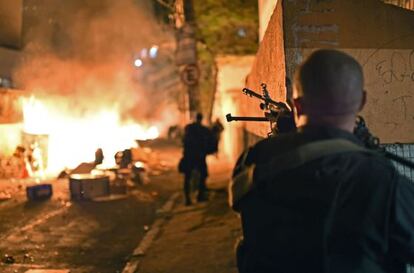Rio shantytown violence spreads to Copacabana neighborhood
Residents of Pavão-Pavãozinho 'favela' block roads in famous beachside district Unrest forces shops to close early, while some tourists are warned not to leave hotels

With less than two months to go before the World Cup kicks off in Brazil, the violence that has rocked Rio de Janeiro in the past week escalated on Tuesday as the unrest spread to the city’s internationally famous Copacabana neighborhood.
On Tuesday afternoon, police clashed with residents of the Pavão-Pavãozinho shantytown as they carried out a violent protest over the death of 25-year-old Douglas Rafael da Silva Pereira, whose body was found inside a daycare center. Although the causes of the man’s death are unclear, police said there was no evidence that Da Silva had been shot. But his mother said her son appeared to have been tortured by law enforcement officers.
Outraged by this latest death, residents of the the Pavão-Pavãozinho favela took to the streets, blocking main roads and setting fire to public transportation vehicles. In Copacabana – located next to the shantytown – people set up street barricades, forcing shops in the tourist district to close early; managers at two hotels asked their guests not to leave the premises.
Tuesday’s events were the latest in a string of protests begun by residents in Rio’s poor hilltop communities where police have beefed up security in recent weeks to chase out drug traffickers and other organized crime gangs. But neighbors complain that the presence of these law enforcement officers has made the situation unbearable because many innocent people have been caught up in related gun battles. They also complain of the amount of indiscriminate searches carried out by officers.
Tuesday’s events were the latest in a string of protests begun by residents in Rio’s poor hilltop communities
Pavão-Pavãozinho is located just two blocks away from Brazil’s famous Copacabana beach, a major tourist attraction. In 2009, the local government was successful in quelling the violence in the favela. However, the unrest returned in September when members of Brazil’s largest and oldest criminal organization, Comando Vermelho (Red Command), began trying to take over territory inside the community. Since then, tension has reigned in Pavão-Pavãozinho.
Taking advantage of the chaos, local drug traffickers attacked a command post belonging to the Police Pacification Unit (UPP), which was located deep inside the favela. According to witnesses, traffickers surrounded police prompting the Special Operations Battalion (BOPE) to rescue the trapped officers by helicopter.
According to Rio city officials, one 30-year-old was killed in the gun battle. But Pavão-Pavãozinho residents reported that a 12-year-old boy was also killed.
Similar gun battles between police and criminal gangs have also been reported throughout the week in Rio’s Nova Brasilia and Rocinha shantytowns.
Tu suscripción se está usando en otro dispositivo
¿Quieres añadir otro usuario a tu suscripción?
Si continúas leyendo en este dispositivo, no se podrá leer en el otro.
FlechaTu suscripción se está usando en otro dispositivo y solo puedes acceder a EL PAÍS desde un dispositivo a la vez.
Si quieres compartir tu cuenta, cambia tu suscripción a la modalidad Premium, así podrás añadir otro usuario. Cada uno accederá con su propia cuenta de email, lo que os permitirá personalizar vuestra experiencia en EL PAÍS.
¿Tienes una suscripción de empresa? Accede aquí para contratar más cuentas.
En el caso de no saber quién está usando tu cuenta, te recomendamos cambiar tu contraseña aquí.
Si decides continuar compartiendo tu cuenta, este mensaje se mostrará en tu dispositivo y en el de la otra persona que está usando tu cuenta de forma indefinida, afectando a tu experiencia de lectura. Puedes consultar aquí los términos y condiciones de la suscripción digital.








































